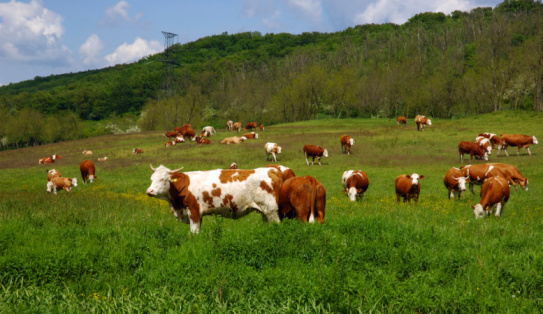The agri-food sector’s global challenge for the next few years will consist in guaranteeing safe and sustainably produced food to a growing population, with forecasts talking about 9.7 billion people by 2050. If, for some, the solution to reconcile food availability and the environment is to stop producing and consuming meat, according to FAO estimates however, in a sustainable scenario, it will be necessary to guarantee an availability of food of animal origin with an average increase of 30%, especially in developing countries (Source: FAO. 2018. The future of food and agriculture).
Agriculture, of which animal husbandry is an integral part, has already responded with hard facts to the challenge of increasing production whilst reducing environmental impacts: over the last 30 years the global agricultural system has managed to feed almost 2.5 billion more people whilst reducing per capita environmental impacts by 20%(Source: Our World in Data). Furthermore, on the basis of recent scientific evidence, the issue of water and soil consumption and the so-called feed vs food competition has seen animal husbandry position itself as an ally of the ecological transition and not as a subject to be fought.
Notwithstanding the enormous progress made, the sector is still viewed with distrust in Europe. In recent years, the sector has tried to make itself available to political decision-makers, in particular on the Farm to Fork (F2F) strategy, by providing sector data and know-how. But the alarm, launched by the sector about the progressive and irreversible dismantling of European livestock production to which a Manichean application of the Farm to Fork that proceeds without the necessary impact studies, has fallen on deaf ears.
The risks to which this process could lead were highlighted, first of all, by the technical report produced by the Commission’s science and knowledge service, the JRC “Modelling environmental and climate ambition in the agricultural sector with the CAPRI model” which takes into consideration the various possible scenarios with respect to the application of the new strategy. The document concludes that whatever the scenario considered, in all sectors of agricultural production and livestock, production decreases of between 5% and 15%are expected, with the worst results for the livestock sector (cattle, chicken, pigs) as well as for the cultivation of cereals, oilseeds, and fruit and vegetables. Against this decrease in production, the report expects a net increase in the prices of agricultural products of about 10%and a drop in exports with a worsening of Europe’s trade deficit. However, the most controversial point raised by the report concerns the hypothesis of the effects of this strategy on emissions. In fact, the report underlines how the F2F strategy could help reduce greenhouse gas emissionsfrom the agricultural sector by 28.4%by 2030, but the report also highlights how over half of the greenhouse gases that Europe will save, will instead be produced by equivalent increases in greenhouse gases in third countries, due precisely to the increase in agricultural production of those countries, aimed at making up for the decline expected in Europe.
Alarming data partially confirmed by the USDA’s, United States Department of Agriculture impact study. According to the American analysis “Economic and Food Security Impacts of EU Farm to Fork Strategy”, in fact, the introduction of the new strategy would cause a 12% drop in agricultural production against a 17% increase in prices. As far as foreign trade is concerned, exports would drop by 20%whilst imports would increase by 2%, with a drop in GDP of about 58 billion Euro and an increased food insecurity for another 22 million people. This scenario has been confirmed by an independent study Market impacts of Farm to Fork: Reducing agricultural input usage.
A worrying scenario that the war in Ukraine has made tangible, showing the extreme fragility of short-sighted supply systems even for developed countries like Italy. Completely outsourcing the production of essential food goods to third countries represents a concrete risk for agri-food self-sufficiency and the dismantling of European meat production could lead to emergencies similar to those that Europe has recently had to face for wheat.
From the aforementioned, it follows that sustainability is a path to be taken together with the meat production sector, and not against it. The strategy to pursue, therefore, cannot be to penalise a sector that is worth around 170 billion Euro and directly employs more than 4 million people, making the necessary food for a healthy diet inaccessible to millions of individuals. Indiscriminately reducing meat production would also lead to the need to import it from abroad, from countries that have a higher environmental footprint than Italy and Europe. Seeing as how today Europe is a model in terms of sustainability for the rest of the world, importing meat with a high environmental impact goes against one of the primary purposes of applying the Farm to Fork strategy itself, the reduction of emissions.
Today the sector looks with interest at the initiative of hundreds of scholars from all over the world who have joined together to propose a global project of scientific researchon the benefits, not only economic, but also nutritional, environmental and social, that meat production can bring. The Dublin Declaration, the name of the initiative, has the main objective of countering the disinformation that afflicts the sector, by contrasting scientific and verified information. The Declaration, to which almost 600 scholars have already adhered, whose scientific bases will be published in March 2023, certainly does not represent the panacea for all ills, but a clear indication of how only a scientific and non-ideological approach can bring real benefits to the necessary process of sustainability, that cannot be postponed and that sees everyone involved, no one excluded.
Carni Sostenibili (www.carnisostenibili.it/en/) (Sustainable Meats) is an Italian non-profit association that represents all the meat processing and transformation chains (beef, pork and poultry), with the aim of promoting sustainable production and conscious consumption of meat and cured meats. Founded in 2012, the association has created a digital communication platform, supported by the publication of studies and research, to promote correct scientific information and its dissemination, regarding the environmental, economic and social sustainability of the entire meat supply chain.








![Un operaio anziano [foto: Carlo Carino/imagoeconomica via IA]](https://www.eunews.it/wp-content/uploads/2025/12/Imagoeconomica_2170811-120x86.jpg)

